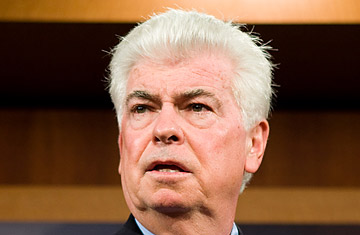
Senator Chris Dodd
(2 of 2)
Lobbyists from a variety of businesses and groups that work with the Senate Banking Committee have expressed concern about Dodd's small, overburdened staff. For example, the Senator has left vacant the top staff position on the committee since his committee director, Shawn Maher, left in December to work for the Obama Administration. "I guess it's hard to find staff. Would you want to go work for someone who might lose his job in two years?" says one financial executive who deals with the committee. "He doesn't have a lot of staff. How he gets work done, that's been a puzzlement."
On this point Dodd says he too is frustrated in waiting for responses from the leadership on requests for more staff. "We're jammed," he says. "I think we'll need some more people, and we're bringing more people on ... I'm really exhausted. It's overwhelming the amount of work and trying to stay on top of it and listening to people about their ideas and trying to figure out what the solutions are." (See the top 10 unfortunate political one-liners.)
One thing Dodd has done of late is tack hard to populism. He has held hearings on credit-card abuses and introduced stringent legislation to prevent companies from luring consumers into dangerous amounts of debt. Last October, Senate majority leader Harry Reid took the unusual move of overriding a Democratic hold on a bill after Dodd tried to block an extension of President George W. Bush's warrantless wiretapping powers over concerns from the left about granting telecom giants retroactive immunity for working with the Administration. Most notably, Dodd, against the wishes of the White House, slipped into the stimulus bill tough limits on compensation for Wall Street firms accepting additional federal bailout money. The restrictions were tougher, and more far reaching, than anything Obama had pushed for, and both White House advisers and the investment-banking community claimed that Dodd's provisions could have the perverse incentive of causing firms that really need help to refuse it. "I was sort of surprised by the blowback on it when nobody offered a counter idea," Dodd says, noting that his amendment passed by a voice vote, with no opposition. As evidence of how much distrust there is of Dodd these days, some commentators reacted to the provisions by claiming the Senator was just doing the bidding of his hedge-fund constituents in Connecticut by making it easier for them to woo talent from their more heavily regulated competitors.
But even many of his former hedge-fund backers aren't particularly happy. As Dodd and House Financial Services Committee chairman Barney Frank work to craft legislation overhauling the nation's banking and securities regulations, Dodd's populist ploys give many on Wall Street pause. "The competition for capital and talent is now global. What we saw when the Senate inserted the executive-compensation restrictions was a cause and effect," Tom Quaadman, who works on financial-sector issues at the U.S. Chamber of Commerce, says, pointing to examples of companies like Deutsche Bank and UBS poaching U.S. talent driven away by the new rules. Looking ahead to re-regulation, Quaadman says, "If we're misapplying solutions and not addressing appropriate problems, this could have unintended consequences for years to come."
Rounding out Dodd's bad year thus far was a botched announcement of a book deal. Last month, Publishers Weekly said Dodd would be the author of Thirteen Days: How the Financial Crisis Changed the Politics of Washington, an announcement that was met with much derision by Republicans. "You have to wonder who advised Senator Dodd that striking a book deal on a crisis that he was at least partially responsible for was a good idea," Brian Walsh, spokesman for the National Republican Senatorial Committee, scoffed in a statement. "A more apt title would be Thirteen Weeks: The Senate Banking Committee Chairman's Time in Iowa While the Housing Market Collapsed." After the negative reaction, Crown Publishers backpedaled, saying a final agreement had yet to be reached and adding that if and when a deal comes about, the book would be more a history of bailouts than an insider's perspective and that the proceeds would go to charity. Dodd says there is still no deal and refused to discuss the particulars of the book, except to say it's "something about last fall."
The book fiasco seemed like yet another instance of bad timing on Dodd's part. After all, being chairman of the Senate Banking Committee gave him little street cred in the 2008 primaries, when the big issue was still the war in Iraq. These days his chairmanship reminds voters of Dodd's problems with Countrywide, and fairly or not, it makes him the face of two deeply unpopular bailouts of Wall Street and an only slightly less unpopular stimulus plan. All of which may explain why Dodd is spending so much time on the Health, Education, Labor and Pensions Committee these days. After all, enacting universal health care ahead of the 2010 elections could be the best cure for what ails him.
The original version of this story misspelled Shawn Maher's name and attributed the book announcement to Crown Publishers instead of Publishers Weekly. It also said there had been a "revelation" that Dodd had gotten a "sweetheart deal" on his mortgage from Countrywide, when in fact it is an allegation that the Senator vehemently denies.
